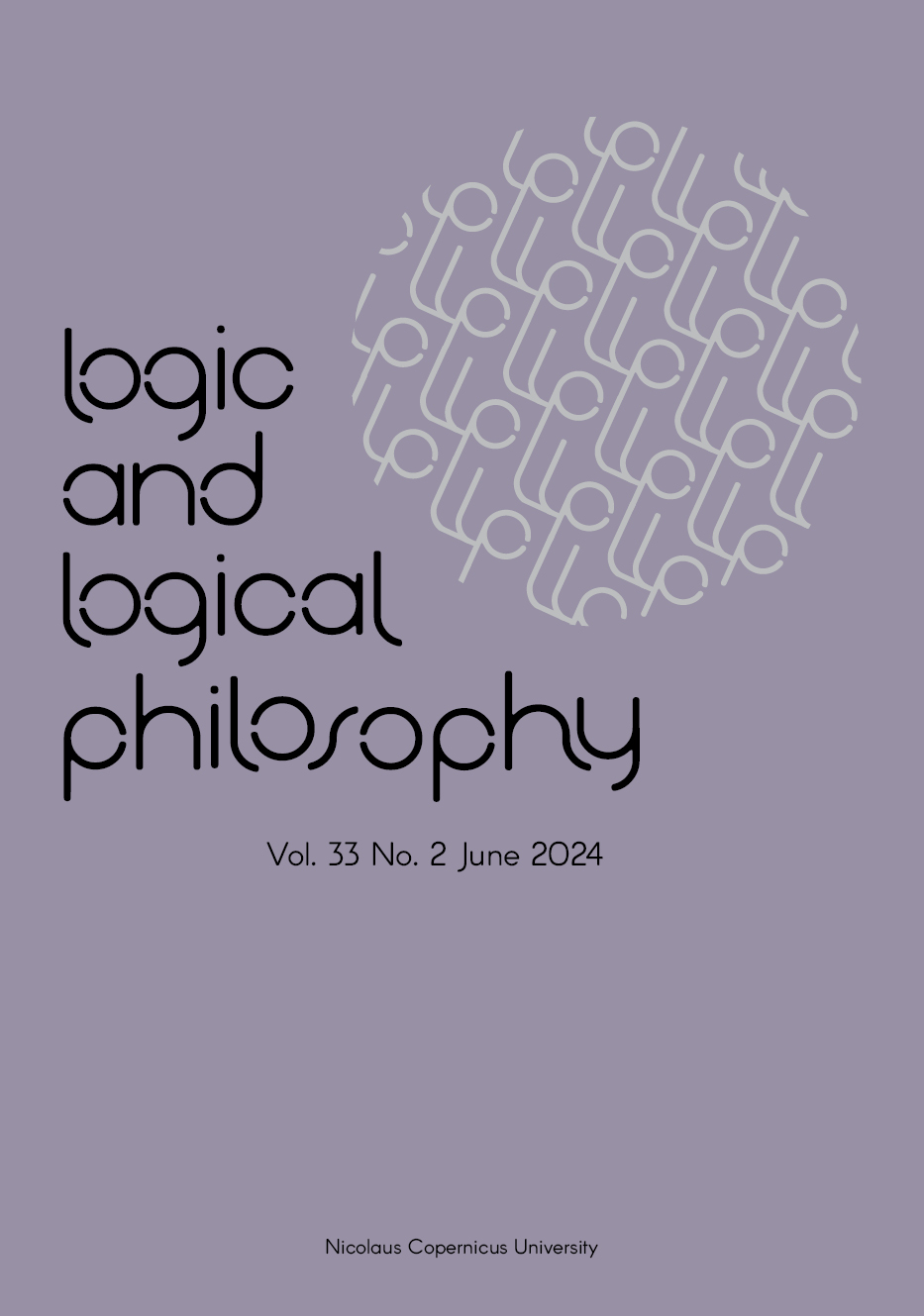First-Order Logic with Adverbs
DOI:
https://doi.org/10.12775/LLP.2024.010Keywords
adverbs, notation, extensions of first-order logicAbstract
This paper introduces two languages and associated logics designed to afford perspicuous representations of a range of natural language arguments involving adverbs and the like: first-order logic with basic adverbs (FOL-BA) and first-order logic with scoped adverbs (FOL-SA). The guiding logical idea is that an adverb can come between a term and the rest of the statement it is a part of, resulting in a logically stronger statement. I explain various interesting challenges that arise in the attempt to implement the guiding idea, and provide solutions for some but not all of them. I conclude by outlining some directions for further research.
References
Borowski, E. J., 1974, “Adverbials in action sentences”, Synthese 28 (3–4): 483–512. DOI: http://dx.doi.org/10.1007/bf00877583
Davidson, D., 1967, “The logical form of action sentences”, pages 81–95 in N. Rescher (ed.), The Logic of Decision and Action, University of Pittsburgh Press.
Fine, K., 1994, “Essence and modality”, Philosophical Perspectives 8: 1–16. DOI: http://dx.doi.org/10.2307/2214160
Fine, K., 1995, “The logic of essence”, Journal of Philosophical Logic 24 (3): 241–273. DOI: http://dx.doi.org/10.1007/bf01344203
Fritz, P., and N. K. Jones (eds.), forthcoming, Higher-order Metaphysics, Oxford University Press.
Jeffrey, R. C., 1967, Formal Logic: Its Scope and Limits, Hackett. DOI: http://dx.doi.org/10.2307/2271990
Kleene, S. C., 1967/2002, Mathematical Logic, New York: Dover. DOI: http://dx.doi.org/10.2307/2218572
König, D., 1927, “Über eine Schlussweise aus dem Endlichen ins Unendliche”, Acta Litterarum ac Scientiarum, Szeged 3: 121–30.
Montague, R., 1970, “English as a Formal Language”, pages 188–221 in B. Visentini (ed.), Linguaggi nella societa e nella tecnica, Edizioni di Communita. DOI: http://dx.doi.org/10.1007/bf01063848
Parsons, T., 1990, Events in the Semantics of English: A Study in Subatomic Semantics, MIT Press.
Pörn, I., 1983, “On the logic of adverbs”, Studia Logica 42 (2-3): 293–298. DOI: http://dx.doi.org/10.1007/bf01063848
Reichenbach, H., 1947, Elements of Symbolic Logic, London: Dover Publications.
Sánchez Valencia, V., 1991, Studies on Natural Logic and Categorial Grammar, Thesis/dissertation, Amsterdam: Universiteit van Amsterdam.
Smith, N. J. J., 2012, Logic: The Laws of Truth, Princeton University Press.
Smullyan, R. M., 1968, First-Order Logic, New York: Springer-Verlag. DOI: http://dx.doi.org/10.2307/2271907
Stalnaker, R. C., 1977, “Complex predicates”, The Monist 60 (3): 327–339. DOI: http://dx.doi.org/10.5840/monist19776037
Thomason, R. H., and R. C. Stalnaker, 1973, “A semantic theory of adverbs”, Linguistic Inquiry 4 (2): 195–220.
van Benthem, J., 2008, “A brief history of natural logic”, pages 21–42 in M. Chakraborty, B. Löwe, M. Nath Mitra, S. Sarukkai (eds.), Logic, NavyaNy¯aya and Applications: Homage to Bimal Krishna Matilal, London: College Publications.
Various, 2017, The Open Logic Text. https://builds.openlogicproject.org/open-logic-complete.pdf" (last accessed November 25, 2023).
Downloads
Published
How to Cite
Issue
Section
License
Copyright (c) 2024 Tristan Grøtvedt Haze

This work is licensed under a Creative Commons Attribution-NoDerivatives 4.0 International License.
Stats
Number of views and downloads: 775
Number of citations: 0







